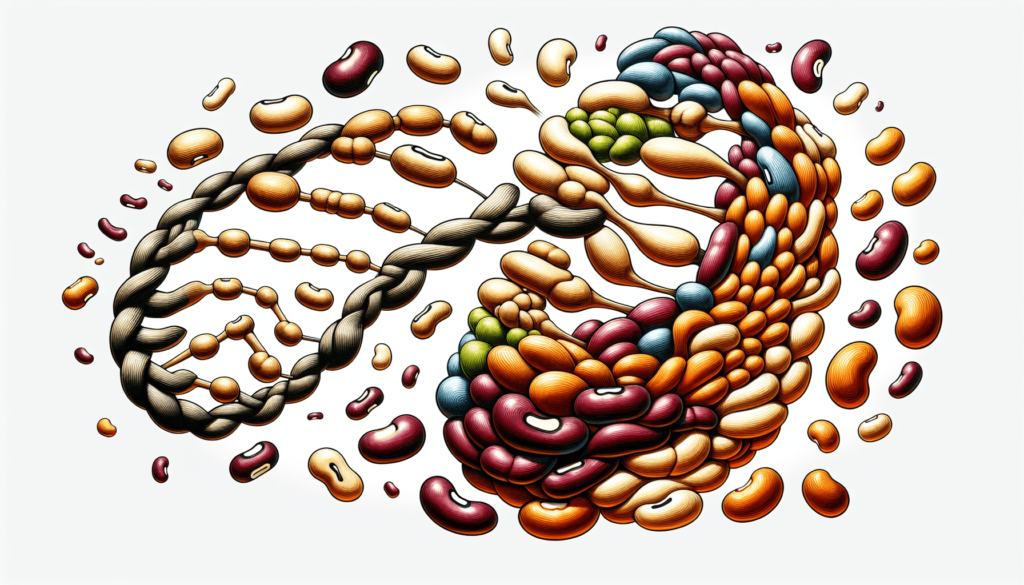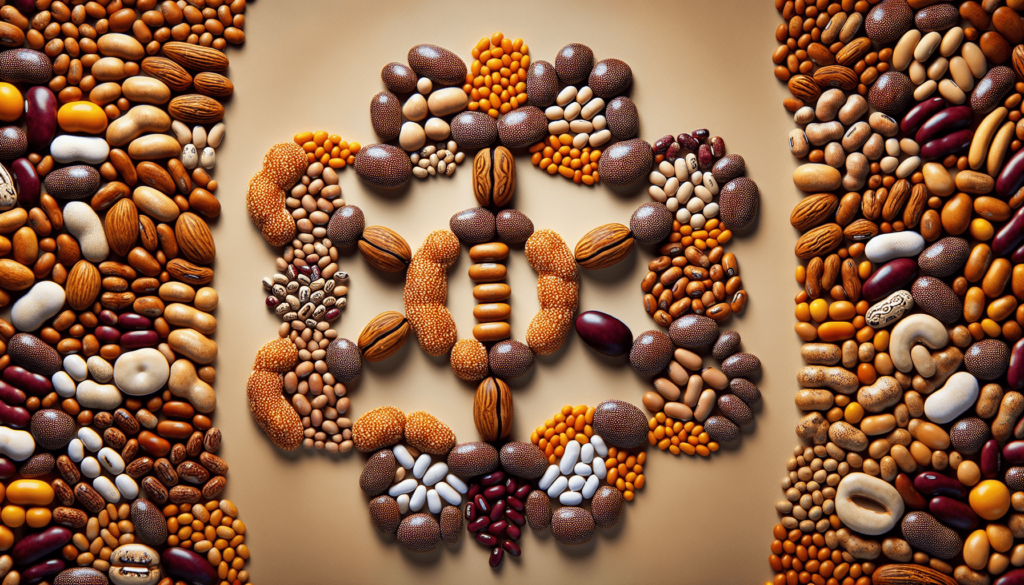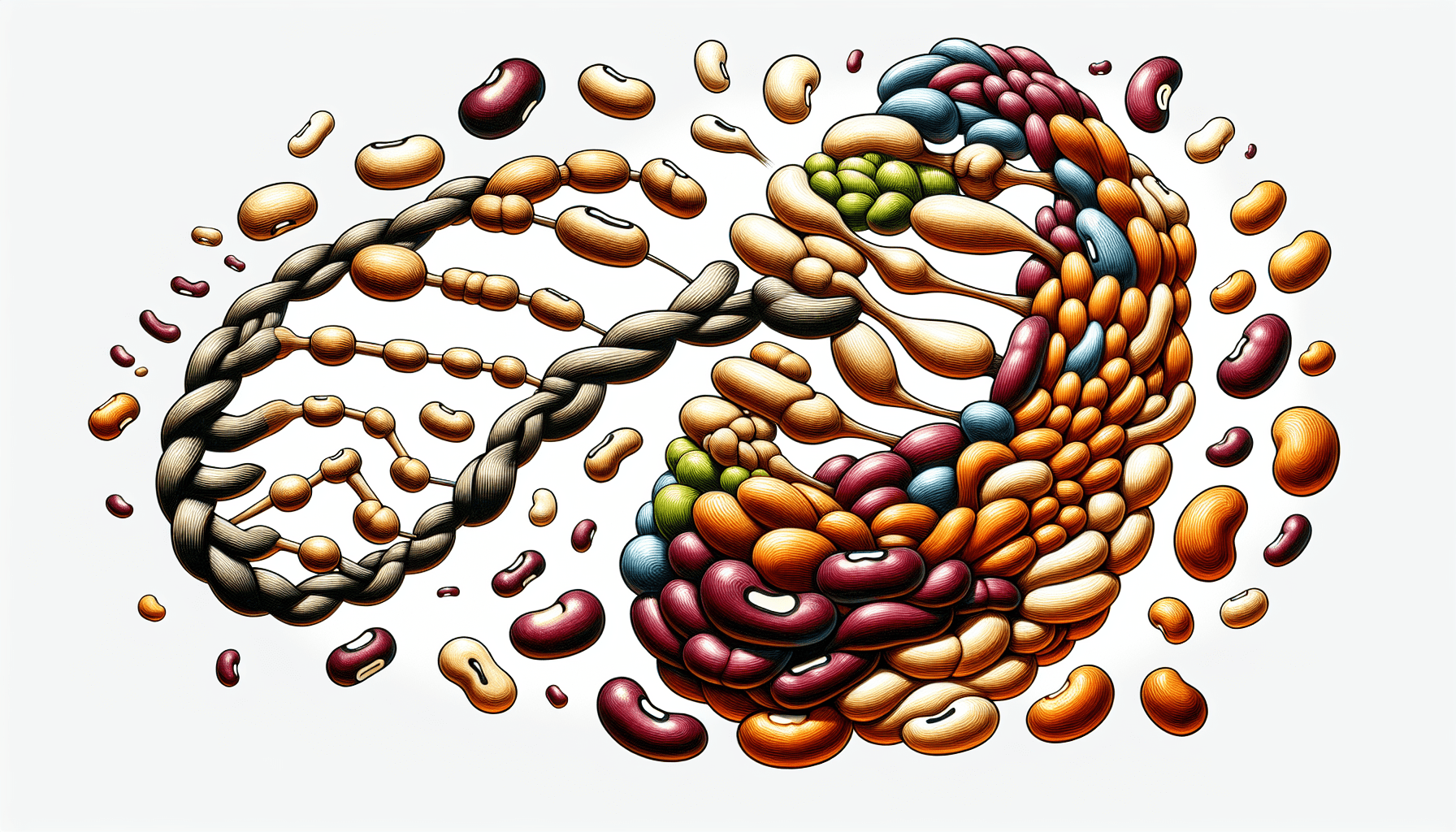If you’re on the lookout for plant-based sources of protein, beans are a fantastic option to consider. But have you ever wondered if there are certain types of beans that pack a higher protein punch than others? Well, you’re in luck! In this article, we’ll explore the world of beans and uncover the specific varieties that are particularly rich in protein. So whether you’re a vegetarian, vegan, or simply looking to incorporate more protein into your diet, keep reading to discover the beans that can help you meet your nutritional goals.
Types of Beans
Kidney Beans
Kidney beans are one of the most popular types of beans, known for their vibrant red color and kidney shape. They are not only delicious but also packed with protein. Kidney beans contain approximately 8 grams of protein per half-cup serving. In addition to being a great source of protein, they are also rich in fiber, vitamins, and minerals.
Black Beans
Black beans, also known as turtle beans, are another nutritious bean variety. They have a rich, earthy flavor and a creamy texture. Black beans contain about 7 grams of protein per half-cup serving. These beans are also high in fiber, folate, and antioxidants, making them a great choice for a healthy diet.
Lentils
Lentils are a type of legume known for their lens-like shape. They come in various colors, including green, brown, and red. Lentils are an excellent source of protein, providing around 9 grams per half-cup serving. Additionally, lentils are rich in fiber, folate, and iron. They are a versatile and nutritious choice for soups, stews, and salads.
Chickpeas
Chickpeas, also known as garbanzo beans, are a popular ingredient in many Middle Eastern and Mediterranean cuisines. They have a nutty flavor and a slightly buttery texture. Chickpeas contain approximately 7-8 grams of protein per half-cup serving. They are also a good source of fiber, iron, and folate. Whether roasted, mashed into hummus, or tossed in salads, chickpeas are a delicious and protein-packed choice.
Navy Beans
Navy beans, also called white beans, are small, oval-shaped beans that resemble the white color of a navy ship. They have a mild flavor and a tender texture. Navy beans provide around 8 grams of protein per half-cup serving. These beans are also rich in iron, fiber, and B-vitamins. Navy beans are a popular choice for baked beans and soups.
Pinto Beans
Pinto beans are a staple in Mexican cuisine, commonly used in dishes like refried beans and chili. They have a speckled appearance and a creamy texture. Pinto beans contain about 7 grams of protein per half-cup serving. Additionally, they are an excellent source of fiber, folate, and magnesium. Including pinto beans in your diet can add a healthy dose of protein.
Adzuki Beans
Adzuki beans are commonly used in Asian desserts and savory dishes. They have a sweet, nutty flavor and a firm texture. Adzuki beans provide approximately 6 grams of protein per half-cup serving. These beans are also rich in fiber, potassium, and B-vitamins. With their unique taste and nutritional benefits, adzuki beans are a great addition to your pantry.
Soybeans
Soybeans are considered a complete protein source, as they contain all the essential amino acids that your body needs. They are a versatile legume, used in various forms like tofu, soy milk, and edamame. Soybeans offer around 14 grams of protein per half-cup serving. They are also rich in fiber, iron, and calcium. Including soybeans or soy-based products in your diet can provide an excellent plant-based protein option.
Protein Content of Beans
General Protein Content
Beans, as a group, are known for their high protein content. They are an excellent plant-based source of protein, making them a great option for vegetarians and vegans. Protein content can vary slightly among different types of beans, but generally, they provide around 6-9 grams of protein per half-cup serving.
Complete Protein
While most plant-based proteins lack one or more essential amino acids, soybeans are an exception. Soybeans are a complete protein, meaning they contain all the essential amino acids that your body needs. This makes them a valuable protein source for individuals following a plant-based diet.
Essential Amino Acids
Beans, in general, are rich in essential amino acids. These amino acids are the building blocks of proteins and are crucial for various bodily functions, such as muscle repair and growth. By incorporating different types of beans into your diet, you can ensure that you are getting a wide range of essential amino acids.

Kidney Beans
Protein Content
Kidney beans are a fantastic source of protein, containing approximately 8 grams per half-cup serving. This makes them an excellent option for individuals looking to increase their protein intake for muscle building or weight management.
Nutritional Profile
In addition to protein, kidney beans are also rich in dietary fiber, providing about 6 grams per half-cup serving. They are low in fat and cholesterol-free, making them a healthy addition to any diet. Kidney beans are also a good source of iron, potassium, and folate.
Health Benefits
The combination of protein, fiber, and other nutrients in kidney beans offers several health benefits. The high fiber content promotes digestive health and can help reduce the risk of chronic conditions such as heart disease and diabetes. Kidney beans also provide slow-burning carbohydrates, making them an excellent choice for sustained energy throughout the day.
Black Beans
Protein Content
Black beans are a great source of protein, providing approximately 7 grams per half-cup serving. This protein content, combined with their low fat and calorie content, makes them an excellent choice for individuals looking to maintain or lose weight.
Nutritional Profile
Black beans are rich in dietary fiber, offering about 8 grams per half-cup serving. They also contain essential minerals like iron, magnesium, and folate. Black beans are a good source of antioxidants, which help protect the body against harmful free radicals.
Health Benefits
Including black beans in your diet can have several health benefits. The high fiber content promotes healthy digestion and can aid in weight management. The antioxidants found in black beans contribute to overall health and may even help reduce the risk of certain diseases, including heart disease and certain cancers.

Lentils
Protein Content
Lentils are an excellent plant-based source of protein, containing around 9 grams per half-cup serving. This high protein content makes them a valuable option for vegetarians, vegans, and individuals looking to reduce their meat consumption.
Nutritional Profile
In addition to protein, lentils are rich in dietary fiber, providing about 8 grams per half-cup serving. They are a good source of iron, folate, and potassium. Lentils also contain antioxidants and phytochemicals, which contribute to overall health.
Health Benefits
Including lentils in your diet can offer several health benefits. The combination of protein and fiber helps promote satiety, making lentils a great option for weight management. Lentils also have a low glycemic index, which means they have a minimal impact on blood sugar levels. This makes them a suitable choice for individuals with diabetes or those looking to stabilize their blood sugar levels.
Chickpeas
Protein Content
Chickpeas provide approximately 7-8 grams of protein per half-cup serving. This protein content, combined with their low fat and cholesterol levels, makes them an ideal choice for heart-healthy meals.
Nutritional Profile
Chickpeas are an excellent source of dietary fiber, offering around 6 grams per half-cup serving. They are also rich in essential minerals like iron, potassium, and folate. Chickpeas contain antioxidants that can help protect against inflammation and oxidative stress.
Health Benefits
Including chickpeas in your diet can have numerous health benefits. The high fiber content promotes digestive health and can help lower cholesterol levels. Chickpeas are low on the glycemic index, providing sustained energy without causing rapid blood sugar spikes. Additionally, the nutrients in chickpeas may contribute to heart health and reduce the risk of certain chronic diseases.
Navy Beans
Protein Content
Navy beans provide around 8 grams of protein per half-cup serving. This protein content, coupled with their low fat and calorie content, makes them an excellent choice for weight management or muscle building.
Nutritional Profile
Navy beans are a good source of dietary fiber, offering approximately 6 grams per half-cup serving. They also contain essential minerals such as iron, potassium, and magnesium. Navy beans are low in sodium, making them suitable for individuals following a low-sodium diet.
Health Benefits
Incorporating navy beans into your diet can have several health benefits. The high fiber content helps promote digestive health and can aid in blood sugar control. Navy beans are also rich in antioxidants, which can help protect against chronic diseases such as heart disease and cancer. Additionally, the combination of protein and fiber in navy beans contributes to feelings of fullness, making them a satisfying addition to meals.
Pinto Beans
Protein Content
Pinto beans provide approximately 7 grams of protein per half-cup serving. This protein content, along with their low fat and cholesterol levels, makes them a nutritious choice for maintaining a healthy bodyweight.
Nutritional Profile
Pinto beans are rich in dietary fiber, offering about 6 grams per half-cup serving. They are also a good source of essential minerals like iron, potassium, and magnesium. Pinto beans contain antioxidants that can help fight inflammation and oxidative stress.
Health Benefits
Including pinto beans in your diet can have several health benefits. The high fiber content promotes digestive health and can help lower cholesterol levels. Pinto beans have a low glycemic index, making them a suitable choice for individuals with diabetes or those looking to manage their blood sugar levels. Additionally, pinto beans provide a steady source of energy and can help support overall physical and mental performance.
Adzuki Beans
Protein Content
Adzuki beans provide approximately 6 grams of protein per half-cup serving. While their protein content is slightly lower than some other types of beans, they are still a valuable plant-based protein source.
Nutritional Profile
Adzuki beans are rich in dietary fiber, offering about 8 grams per half-cup serving. They are a good source of essential minerals like iron, potassium, and magnesium. Adzuki beans also contain antioxidants, which help protect against cellular damage.
Health Benefits
Including adzuki beans in your diet can provide several health benefits. The high fiber content promotes digestive health and can aid in weight management. Adzuki beans are also rich in antioxidants, which contribute to overall health and may help reduce the risk of certain chronic diseases. Additionally, the nutrients in adzuki beans support healthy blood sugar levels and cardiovascular health.
Soybeans
Protein Content
Soybeans are an exceptional source of protein, providing approximately 14 grams per half-cup serving. Their high protein content, coupled with being a complete protein, makes them a valuable option for individuals following a plant-based diet or looking to add more protein to their meals.
Nutritional Profile
In addition to protein, soybeans are rich in dietary fiber, offering about 8 grams per half-cup serving. They are also a good source of essential minerals such as iron, calcium, and magnesium. Soybeans contain phytochemicals called isoflavones, which have antioxidant and anti-inflammatory properties.
Health Benefits
Including soybeans or soy-based products in your diet can offer several health benefits. The high protein content helps support muscle growth and repair. Soybeans are also rich in fiber, promoting healthy digestion and aiding in weight management. The isoflavones in soybeans have been linked to various health benefits, including reduced risk of heart disease and improved bone health. Additionally, soybeans are a good source of plant-based calcium, making them an excellent choice for individuals following a dairy-free diet.
In conclusion, beans are an incredibly versatile and nutritious food group. They are an excellent source of plant-based protein, offering various health benefits. Whether you prefer kidney beans, black beans, lentils, chickpeas, navy beans, pinto beans, adzuki beans, or soybeans, each type of bean contributes to a balanced and protein-rich diet. By incorporating these beans into your meals, you can enjoy their delicious flavors while reaping the nutritional benefits they provide. So go ahead and start exploring the world of beans, embracing their protein content and enhancing your overall well-being.

